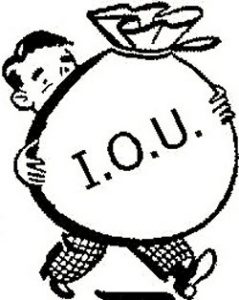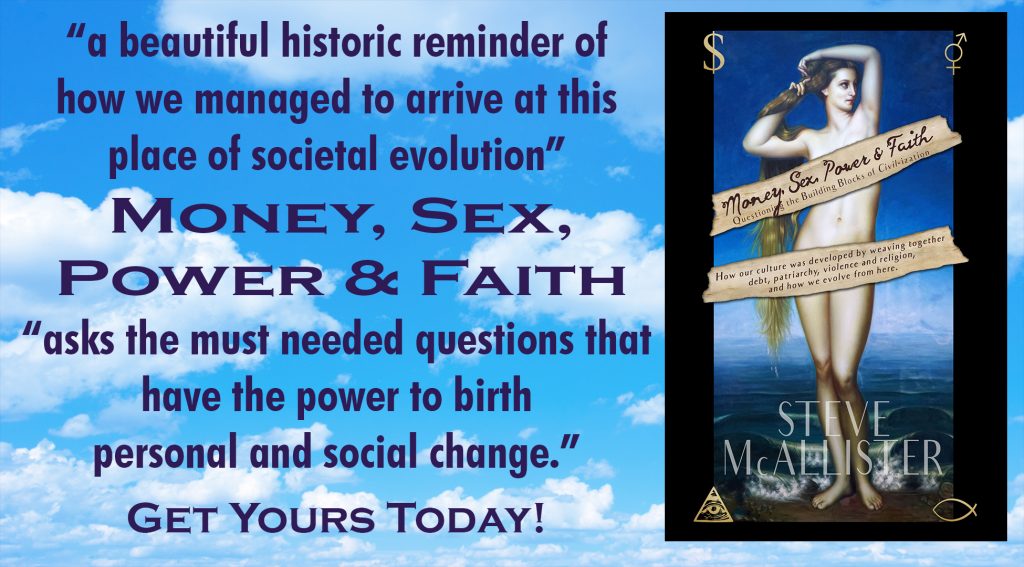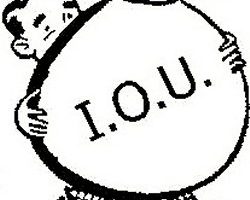The following is a chapter from Money, Sex, Power & Faith.
Order your copy in paperback or for Kindle!
“As humanity perfects itself, man becomes degraded.
When everything is reduced to the mere counter-balancing of economic interests,
what room will there be for virtue?
When Nature has been so subjugated that she has lost all her original forms,
where will that leave the plastic arts?
And so on. In the meantime, things are going to get very murky.”
– Gustave Flaubert
 Considering both the written word and recorded trade exchanges came into use around 3300-3100 BC, it may very well be that writing was developed primarily for the letters “IOU.” Although Jesus would come to take issue with it a few millennia later, banking originated largely in Mesopotamian temples and palaces, with the new technology of the written word being used to keep ledgers on the grains, cattle, and metals stored there over the next few centuries. It was also during this time, roughly 3,000 BC, the shekel came into play, allowing for an established amount of barley to be traded for an established amount of metal, and much of this was done under the auspices of the emerging patriarchal religions in the monumental temples around which tribes were created.
Considering both the written word and recorded trade exchanges came into use around 3300-3100 BC, it may very well be that writing was developed primarily for the letters “IOU.” Although Jesus would come to take issue with it a few millennia later, banking originated largely in Mesopotamian temples and palaces, with the new technology of the written word being used to keep ledgers on the grains, cattle, and metals stored there over the next few centuries. It was also during this time, roughly 3,000 BC, the shekel came into play, allowing for an established amount of barley to be traded for an established amount of metal, and much of this was done under the auspices of the emerging patriarchal religions in the monumental temples around which tribes were created.
All these years later, many are opening up to understanding the folly of initially basing the monetary system on food. The argument has long been that we need to keep growing the food supply in order to feed all of the hungry people in the world. Yet as the commoditization of food has grown, and its value as a producer of money has outshined its value as a contributor to life, the end game of totalitarian agriculture has found America throwing away 40% of the food it grows because they can’t sell it while 14% of Americans are still “food insecure,” according to the USDA.
As an example of how differently our new system of indebted agriculture was from the egalitarianism of nomadic hunters, in Debt: The First 5000 Years, David Graeber writes, “The refusal to calculate credits and debits can be found throughout the anthropological literature on egalitarian hunting societies.” On his conversation with a modern nomadic hunter, Graeber continues, “Rather than seeing himself as human because he could make economic calculations, the hunter insisted being truly human meant refusing to make such calculations, refusing to measure or remember who had given what to whom, for the precise reason that doing so would inevitably create a world where we began ‘comparing power with power, measuring, calculating’ and reducing each other to slaves or dogs through debt.”
Many primitive cultures still practice this tradition of not keeping track of things. Many people in civilized cultures often feel as if they are at their best when they have occasion to practice economics at the gift level. Whenever someone is able to use their skills or excess to help somebody out of a jam, and decline payment, people often feel more valuable than if they had been paid for it.
Yet, we can only practice that type of economics when we feel secure enough to do so, and with the demands of our current system, it gets very challenging to do. As humans developed our distinctions and divisions, we created new illusions of complexity to manage our new methods of accounting.
With the status of property ownership now fully in play, there was, among this new language of trade, the first establishment of statehood, and government was developed to account for our new relationship with the rest of the world. Since this new technology now lent credence to what were heretofore merely imaginary lines in the sand, there was suddenly the need to defend our demarcations and all of the stuff we had begun to mine, harvest, and store. Along with all of this new busy-ness and the formations of nations around these new technologies, since humans had created things we could fight for, the first recorded war occurred in this Mesopotamian region between the Sumerians and Elamites in 2,700 BC.
Now fully funded, the civil state became what Aristotle called, “the highest form of community and aims at the highest good.” Consisting of villages and households with slaves, “it exists to satisfy man’s daily needs… Men form states to secure a bare subsistence; but the ultimate object of the state is the good life… It is founded on natural impulse, that toward political assistance.”
Throughout the next several centuries, the Patriarchal Age firmly took hold, and from 1800-1200 BC, the incorporation of money and property, including the expanding ownership of other people, and wars for further conquest started to become humanity’s standard operating procedure. What would become biblical accounts started around 1,900 BC, and the first mention of money in the book of Genesis was in reference to circumcising a purchased slave. In Babylon, what is now known as Iraq, the Code of Hammurabi was written around 1700 BC, setting up formal codes for the use of money, including interest on debt, fines for misuse, and the treatment of slaves.
Order your copy of Money, Sex, Power & Faith today!



When you have total control of the food you control the world,the the Illuminati is fully aware of this the Illuminati is fully aware of this and they will control the food for the world and enslave the whole world in doing that but when the Antichrist comes he can take over with ease because people have to eat.
Fortunately, no one can have total control of food as we can see through the number of backyard and commmunity gardens popping up around the world.